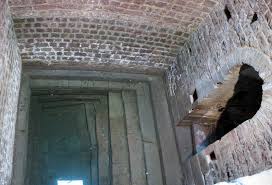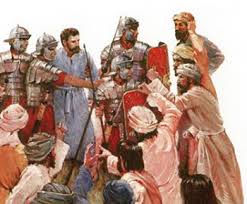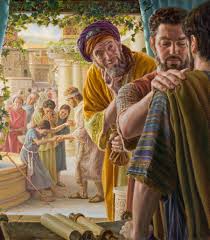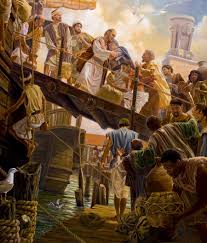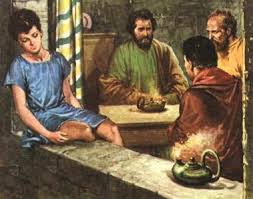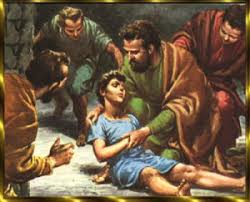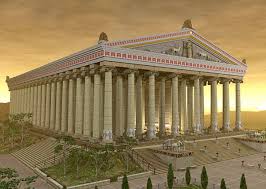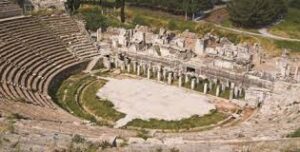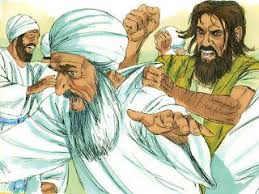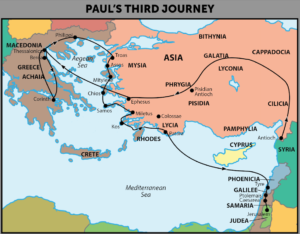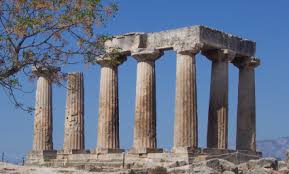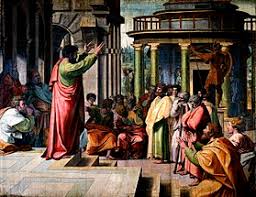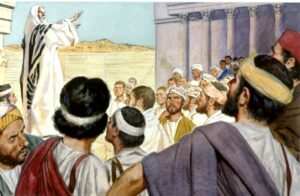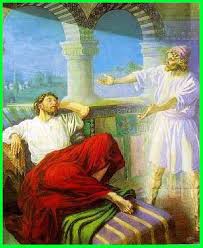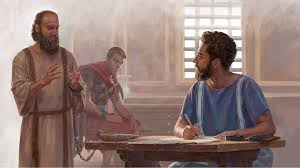Cp – Paul’s Testimony on the Steps of Fort Antonia 21:37 to 22:21
Paul’s Testimony
on the Steps of Fort Antonia
21:37 to 22:21
57 AD
Paul’s testimony on the steps of Fort Antonia DIG: From 21:30-36 why might the commander think Paul was this Egyptian revolutionary? Under the circumstances, why did Paul think it was so important to address this hostile crowd? How would the situation fall apart even further if the charges of 21:28 were left unanswered? How did Paul’s use of this Hebrew (along with the content of his speech) force the Jews to listen? His speech in 21:1-10, recounts the events of 9:1-18. In how many ways does Paul point out how much alike he and the crowd are? What is he hoping to achieve by calling that to their attention?
REFLECT: Paul told his own story instead of preaching a sermon to this crowd. When do you find your story the most effective and helpful to others? How has your faith in Yeshua changed your life in a surprising way? What is one of the hardest things you have had to experience because of your faith? What strikes you as the most intriguing part of Paul’s testimony? What about your own salvation story? How many times have you told it to someone? No one can refute it because it is your experience. Can you tell your story in just a few minutes? When was the last time you did so?
Having been attacked by a mob at the Temple under false assumptions and about to be stoned to death, Paul was miraculously rescued by 500 Roman soldiers (to see link click Co – Paul’s Arrest in Jerusalem). They stopped the mob in their tracks and proceeded to take Paul up the steps of Fort Antonia for interrogation when, Paul spoke to Claudius Lysias, the commander of the Roman cohort stationed in Jerusalem.
Paul’s surprising request: Up to this point, Paul had remained silent. But, as he reached the top of the stairs and was about to be brought into the headquarters, he said to the commander, Claudius Lysias (23:26), in Greek, “Can I say something to you?” Paul, in contrast to the mob was quite calm. Both the Spirit of God (20:22) and the prophet Agabus (21:10-11) had told him that that bondage and afflictions awaited him in Jerusalem (21:37). Lysias said, “You know Greek? Paul’s language was polite, polished Greek, and Lysias was amazed that this. But, he was multilingual. Paul spoke Greek, the universal language of the Roman Empire, and Aramaic, the everyday language of the Palestinian Jews (21:40, 22:2), and as a trained rabbi, he was also fluent in Hebrew, the holy tongue (see below) and the language of the TaNaKh.
Suddenly, realizing Paul was no terrorist, Lysias said: Then you’re not the Egyptian who stirred up a rebellion some time ago – and led four thousand men of the Assassins (literally the dagger men) out into the desert” (21:37b-38). The first-century historian Josephus reports that he came to Jerusalem around 54 AD, during the time of Felix (23:24). At this time someone came out of Egypt who said he was a prophet and advised the masses of the common people to go with him to the Mount of Olives, where he would show them how, at his command, the walls of Jerusalem would fall down; and he promised he would enable them to enter the city through those walls after they had fallen down. When Felix was informed of these things, he ordered his soldiers to take their weapons, and he came against them from Jerusalem with a great number of horsemen and footmen. Felix attacked the Egyptian and the people with him, slaying four hundred of them and taking two hundred alive. The Egyptian himself escaped from the battle but did not appear any more (condensed from Antiquities of the Jews 20:8;6).517 And because the Egyptian had escaped, the commander assumed that Paul was that Egyptian.
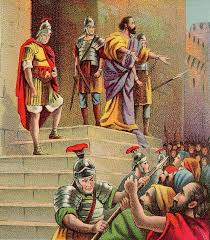
Paul replied: I am a Jewish man, from the Hellenistic city of Tarsus in Cilicia, a citizen of no insignificant city. The reference at this point is to his Tarsian citizenship, not his Roman citizenship, which is not divulged to Lysias until later (22:25-29). I beg you, let me speak to the people (because he had the assurance of God that he would not be killed). Compared to the Jewish mob, Lysias was an honest, fair, and open-minded. He gave Paul permission to speak. At that point, Paul stood on the top of the steps and motioned to the people with his hand. When there was a great hush on the crowd, he spoke to them in Hebrew (21:39-40). The crowd had accused him of teaching against the Jewish people, the Torah, and the Temple. Paul’s speech was his defense against these three charges.
The fact that Paul chose to address the mob in Hebrew is important. In presenting his defense, Paul evidently wished to demonstrate first and foremost his devotion to the Torah and the commandments. This was normally expressed by the use of the holy tongue – a description given to Hebrew, but not to Aramaic. Hebrew, apparently, bore the values of “folklore” of the Jews, while Aramaic was not perceived as carrying any cultural message and merely served as a means of communication without commanding any loyalty. Hebrew was regarded as the “language of creation” that an angel revealed to Abraham (Jub. 12:25ff; Gen. R. 18:4). The rabbis taught that not only was it the angelic tongue (Hag. 16a; Sot. 33a), but it was also God’s own language because every name in Genesis up to the Tower of Babel (Genesis 11:1-9) is a Hebrew name. Therefore, despite Aramaic’s function as the common language in Jerusalem and in many parts of the diaspora (Josephus War 1.3), Paul may have preferred to use Hebrew to convey the primary point of his loyalty to the Torah and the Temple at the possible expense of not being understood by every single person present. The fact that Paul chose to address the crowd in the holy tongue – which Lysias did not understand – indicates that he considered himself to be replying to the Jews and specifically to their objections.518
Paul’s dynamic defense: Paul begins by respectfully acknowledging being in the presence not only of his brothers, but also of his elders or fathers. He said: listen to my defense which I now present to you. When they heard that Paul was addressing them in Hebrew, that gained their attention and they became even more quiet (22:1-2a). Then he proudly declared: I am a Jewish man (becoming a believer in Yeshua did not negate his Jewishness). Sha’ul started off saying that he was born a Jew; by announcing this he increased his identification with his Asian accusers. When we speak about Yeshua, we need to speak in the language our listeners can understand. Paul never forgot his national identity. He identified with his listeners.
But he was brought to Jerusalem, probably about the age of twelve or thirteen. But even though he was in the Holy City until he was an accomplished adult, he evidently never saw Jesus in the flesh. And he was trained at the feet of Gamaliel. Among the Jews he is known as Rabban Gamaliel. In Jewish schools the rabbis sat on a high chair, the elder pupils on a lower bench, and the youngest on the ground. That is why they were said to be learning at the rabbis’ feet.519 In other words, Paul was raised in Pharisaic Judaism as taught by Rabban (our master) Gamaliel. He continued: I was trained strictly according to the Torah of our fathers, being a zealot for God just as all of you are today (22:2b-3). Paul understood their zeal because he himself was once guilty of the same misplaced zeal as he was about to confess. It is said that a fool learns from their own experiences, but the wise learn from the experiences of others. Paul was hoping that even among the zealots in the mob there would be some who were wise and could profit from hearing where their present path would lead.520
Paul had been the believers most-feared persecutor from Stephen’s martyrdom until his conversion. I persecuted this Way (9:2, 19:9 and 23, 24:14-22; also see Galatians 1:13) to the death, arresting both men and women and throwing them in prisons. And if anyone still doubted his zeal for Ha’Shem, Paul could call on the kohen gadol and all the council of elders in the Sanhedrin (see the commentary on The Life of Christ Lg – The Great Sanhedrin) who could testify about him. This was Paul’s zeal in Judaism (First Timothy 1:13-15). The point Paul was trying to make was that his attitude toward the Way did not incline him to accept the gospel either. I also received letters from them to the brothers, and I went to Damascus to bring back to Jerusalem even those who were there in chains – to be punished (22:4-5). His zeal even led him to pursue believers outside the Land. Then Paul delivered the second report of his coming to Messiah. He diverges in some details from his first recounting of 9:3-19 (see Cy – Paul’s Defense Before Agrippa on reconciling the differences).
Paul’s salvation story: But it happened that as I was traveling and drawing near to Damascus, about noon when the sun a brightest, a great (Sh’khinah glory) light from heaven suddenly flashed all around me. Speechless with terror, I fell to the ground and heard a voice saying to me, Sha’ul, Sha’ul (the only reason Paul refers to himself as Sha’ul is because of his past), why do you persecute Me? I answered, “Who are you, Lord? He said to me, I am Yeshua ha-Natzrati, whom you are persecuting (22:6-8). The Jews would have understood the concept of the Voice that Paul heard. The rabbis taught that when God speaks in heaven, “the daughter of His voice” the bat-kol, or an echo is heard on earth. After the last of the prophets, it was considered that God provided the bat-kol to continue to give guidance to the people (Tractate Yoma 9b).
Now those who were with me saw the (Sh’khinah glory) light, but did not understand the sound (Greek: phone meaning a sound) of the One who was speaking to me (22:9). The Greek text makes a distinction between hearing a sound as a noise or as a message. It appears that Paul’s companions heard Messiah’s voice as a sound but not as distinct words so as to understand the message (for a similar example see John 12:28-29).521 Likewise, they also saw the light but they did not see Jesus (see Bf – Peter’s Vision: A closer look at visions or dreams), they also heard a voice but they couldn’t make out what it was saying. So Paul submitted immediately and said: What shall I do, Lord? And the Lord said to me: Get up, and go to Damascus. There you will be told all that you have been appointed to do (22:10). Paul was to complete the journey, but for a different purpose for which you left.
But since I could not see because of the brilliance of that Sh’khinah glory light, I was led by the hand by those who were with me and came into Damascus. Then a certain Ananias – a devout man according to the Torah, well-spoken of by all the Jewish people living there – came to me. In this way, Paul emphasizes the fact that his (prophetic) call was made in a Torah-observant context by a pious man and the bat-kol, as well as excluding the possibility that he has been directed by a “mystic or a dreamer of dreams” to do anything forbidden by the Torah.522 Standing before me, he said to me, ‘Brother Sha’ul, look up!’ In that very moment, I looked and saw him (22:11-13)! This fact about Ananias, not reported in 9:3-19, was relevant for Paul’s present audience.
And he said: The God of our fathers handpicked you to know His will – to see Tzaddik, or the Righteous One, and to hear an utterance from His mouth. This meant that in addition to being an apostle, Paul was as prophet, receiving direct revelation from God (Ephesians 3:1-13). For you will be a witness for Him to all people of what you have seen and heard. Now why are you waiting? Get up and be immersed, and wash away your sins, calling on His Name” (22:14-16). Just like 2:38, some use this verse to try and prove that immersion is necessary for salvation. But at this point Paul was already saved and addressed as a brother by Ananias. While immersion is not necessary for salvation, it is necessary for obedience. Paul’s sins were already washed away not by immersion, but by calling on the name of the Lord (Romans 10:13).
Acts contains two other accounts of this same story: Luke’s third person report in (see Bc – Sha’ul Turns from Murder to Messiah), and another first person account before governor Festus and King Agrippa II (see Cv – Paul’s Defense before Governor Felix). Each time the story is told, the details vary (see 26:13-18 on recording these differences). This is Luke’s way of emphasizing the importance of Paul’s conversion and it actually ends up being eight percent of the entire book!
Paul’s changed life: After Paul was saved, and a brief period of ministry in Damascus (9:20-25), he spent three years in Nabataean Arabia (Galatians 1:17-18). Having returned to Jerusalem (22:17a), Paul was speaking and arguing with the Hellenists, but they were trying to kill him (9:29). But, as he was praying in the Temple Compound, Paul said: I fell into a trance (Greek: ekstasis, meaning standing outside oneself). This describes a unique apostolic experience of being transported beyond the normal senses to the supernatural realm to receive divine revelation. The word is used twice to describe Peter’s vision at Joppa (10:10 and 11:5).523 At that time, Paul declared: And I saw Messiah saying to me (see Bf – Peter’s Vision: A closer look at visions or dreams): Hurry! Get out of Jerusalem quickly, because [the Jewish people] will not accept your witness about Me (22:17b-18). When the brothers found out, they brought him down to Caesarea and sent him off to Tarsus (9:30). The Jewish people didn’t believe Stephen when he said: he said, “Look, I see the heavens opened and the Son of Man standing at the right hand of God” (7:55-56), and they wouldn’t believe Paul. This is the third of four times that Paul saw the Lord in a vision (9:5; 18:9-10; here, and 23:11).
Paul immediately trots out his Jewish credentials, objecting that the Jews of Jerusalem ought to accept what he says because they know how diligently he opposed the believers in the past. And I said: Lord, they themselves know that in one synagogue after another, I was imprisoning and beating those trusting in You. Even when the blood of Your witness Stephen was spilled, I too was standing by and approving, and guarding the clothing of those who were killing him. But Yeshua repeated his command: Get going! For I will send you far away to the Gentiles (22:19-21). This reminds us of Abram’s call: Get going out from your land, and from your relatives, and from your father’s house, to the land that I will show you. My heart’s desire is to make you into a great nation, to bless you, to make your name great so that you may be a blessing. I will bless those who bless you and whoever curses you I will curse, and in you all the families of the earth will be blessed (Genesis 12:1-3). This passage may also have resonated in Paul with Jonah’s calling to the Gentile city of Nineveh, “Now the word of ADONAI came to Jonah the son of Amittai, saying, ‘Arise, go to the great city of Nineveh . . .’ (Jonah 1:1-2).”
Why won’t the Jews of Jerusalem listen to Paul? Because a believer’s having opposed the gospel in the past in not what makes a nonbeliever believe. On the contrary, the believer’s faith now outweighs everything else about him. No matter how reasonable his beliefs seem to himself now, a believer cannot substitute his own stormy process of coming to faith for that of someone else.
Commanding Paul to get on with his task of evangelizing the Goyim, Yeshua saved Paul years of fruitless ministry that would have been the outcome of following his own natural desire to devote all his energy to converting the Jews (Romans 10:1). Paul’s earthly wisdom would not have lead him to the specific ministry Messiah had designed for him. Our Lord knows better than we do how we can best serve Him. Moreover, the book of Acts shows that Paul experienced no small measure of success with Jews as well.524 There is a lesson here for all of us.
Paul’s Gentile mission was therefore connected closely to the refusal of the Jews to accept his witness to Messiah. One recalls Yeshua’s parable that makes the same point (see the commentary on The Life of Christ Hp – The Parable of the Great Banquet). It was also a problem Paul wrestled with in Romans 9-11. His answer was that the stubbornness of Isra’el was a temporary hardening to allow for the gospel to be taken to the Gentiles. In any event, the reference to the Goyim led to an immediate fulfillment of Jesus’ warning that the Jews would not accept Paul’s witness. The silent crowd became, once again, a vicious mob, and Paul was silenced once again.525
Acts 22 relates Paul’s account of his own Damascus-road conversion. His approach contains several elements the build a powerful witness, and is a model for us to tell of our personal salvation experience. You can learn from the following four elements in sharing your testimony.
First, Paul communicated simply and clearly. Paul spoke in Greek to the commander and in Hebrew to the Jews. Few of us are fluent in several languages, as Paul was, but we can apply his example, learning to communicate more effectively by speaking the language of our hearers. We need to be careful with speaking with unchurched people that we do not use theological terms that they don’t understand. We have to resist the assumption that every listener knows our biblical or theological terms. Of course, learning to speak understandably doesn’t mean adopting any level of vulgarity. It simply means putting the cookies on the bottom shelf so they’re easy to get to, and speaking with a great level of clarity.
Second, Paul honestly described his former life. We lose our listeners the instant they sense an attitude of superiority. Paul spoke with honesty and humility. As he explained his background and his persecutions of the Church, he related with the crowd as one who had been exactly where they were. Not all of us have a background as dramatically different from our present lifestyle as Paul did, yet we have all been lost. Lost is lost.
Remember an important principle about sharing our former conduct. Generalizations are usually best. I try to avoid becoming specific about ungodly actions in my past. I want the listener to focus on my Savior, not my behavior. Sometimes we glorify ungodly behavior by highlighting how bad we were. This can dishonor God, and it can dishonor the listener by stirring up unnecessary mental images of sin. Share past conduct with caution!
Third, Paul described his conversion experience. Few of us have experienced the dramatic conversion Paul described, but we can all tell how we accepted Christ. We each have our own story to tell. Don’t think your testimony is meaningless if you didn’t have a dramatic conversion. Every conversion cost the same amount of Messiah’s blood shed on the cross. Your story is just as meaningful as the most dramatic conversion ever told!
In the parable of the prodigal son (see the commentary on The Life of Christ Hu – The Parable of the Lost Son and His Jealous Brother), the older brother father accepted his brother after a season of riotous living. He didn’t understand the biggest difference between them was that the prodigal son had to live with the personal loss and suffering. If your conversion was less sensational than others, praise God for less drama! With it probably came less pain! You don’t have to see a bright light from heaven to tell your story. The determining factor is not how exciting your conversion was but how excited about the Lord and what He is doing in your life now!
Fourth, Paul shared how he received his commission. Paul was very clear that God had a purpose for his life. The people we talk to need to know that there is life after salvation! Salvation is not only about eternity. Salvation is also the open door to a rich life here on earth in which we enjoy the love and direction of an active God. Many unbelievers are turned-off accepting Yeshua as their Lord and Savior because they’re afraid they’ll have to give up something to live for Him. As we share our testimonies, we can help them see all we’ve gained since we were saved; all the ways our lives have been blessed and enhanced by His presence within us. Make your sense of ongoing purpose a part of your testimony. We often have no idea how much people are struggling to find a reason to live and to persevere through difficulty.
Father God, You have given me a marvelous story to tell – how You have rescued me from the domain of darkness and transferred me into the Kingdom of Your beloved Son, in whom I have redemption and the forgiveness sins (Colossians 1:13-14). I have been crucified with Messiah; and it is no longer I who live, but Messiah lives in me. And the life I now live in the body, I live by trusting in Your Son – who loved me and gave Himself up for me (Galatians 2:19-20). May I not hide this from my children, but tell the next generation the praises of ADONAI and His strength and the wonders He has done, so that the next generation might know, even the children yet to be born: they will arise and tell their children. Then they will put their trust in God, not forgetting the works of God, but keeping His commandments (Psalm 78:4 and 6-7).526



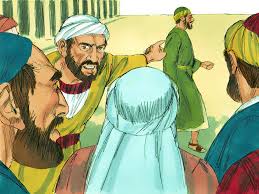
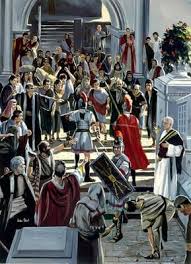
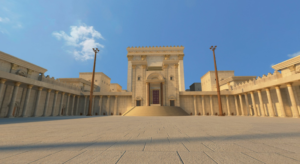 called the Chamber of the Nazirites, where they would cut their hair and solemnly burn it, along with a Peace Offering (see the commentary on
called the Chamber of the Nazirites, where they would cut their hair and solemnly burn it, along with a Peace Offering (see the commentary on 
